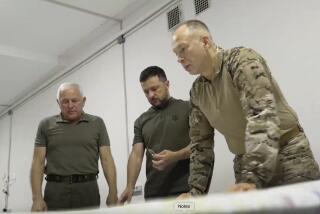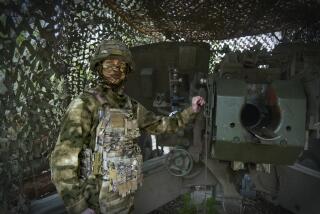Loss of 2 Russian Planes Points to Tougher Foe
- Share via
MOSCOW — Russia lost two aircraft over two days in its renewed war against separatist Chechnya, a startling setback that suggests the Chechen guerrillas are better armed than in the 1994-96 conflict that Russia lost.
Russian officials, however, claimed Tuesday to have seized the northern third of the republic’s territory.
The invasion of Chechnya in recent days, the most serious Russian conflict since the 1994-96 war, has alarmed some analysts and opposition politicians, who warn that the operation to wipe out terrorists seems to be turning into a full-blown war.
The loss of the SU-25 and SU-24 planes on Sunday and Monday, which topped Russia’s television news bulletins Tuesday, may presage a significant increase in Russian losses compared with the last conflict. That time, equipped mainly with grenade launchers, rifles and machine guns, the Chechens destroyed only a handful of planes in 22 months of fighting.
The Chechen side claimed that a U.S.-made Stinger antiaircraft missile was used to shoot down one plane, and according to Interfax news agency, Russian intelligence believes that the Chechens obtained at least four Stingers from Afghanistan.
Russia said the SU-25 attack plane was unarmed when it disappeared Sunday. An SU-24 bomber sent to search for the missing plane was also lost. The fate of the pilots is unknown.
In this conflict, the Russian military is running an all-out PR offensive to prove that its bombs are landing in the right places and that the military operation is on track--but reports from Chechnya indicate that villages and civilians are being hit.
The latest Russian action in Chechnya seems both punitive and political.
Russian authorities blame Chechen terrorists for several recent apartment bombings that killed a total of more than 300 people in Moscow and southern Russia.
The war could have a significant impact on approaching parliamentary and presidential elections, with the Russian media less skeptical than it was in the 1994-96 war. Since Russia began a heavy bombing campaign against Chechen villages last month, the popularity of Prime Minister Vladimir V. Putin, named by President Boris N. Yeltsin as his preferred successor, has sharply increased.
Russia’s attack began after Chechen rebel leader Shamil Basayev invaded neighboring Dagestan in August with about 1,500 fighters and seized several villages.
The Russians’ strategy seems to be to take and hold Chechen territory north of the Terek River, which runs about 12 miles north of Chechnya’s capital, Grozny, at its closest point. Russia hopes that the river will be a natural boundary against guerrillas.
After announcing Tuesday that Russia had seized the territory north of the river, Putin said the operation was “far from over” and that its aim was to destroy terrorist groups.
“I want to stress that Russia is a peaceful country. We are not waging war,” he said, arguing that Russia’s action was tough but legal.
He plans to install an alternative Chechen government in the north and promised to pump money for social services into the region.
Putin also plans to resettle the refugees now fleeing Chechnya in the area. At least 105,000 refugees have fled west to neighboring Ingushetia, which has found temporary housing for only 8,000 of them. Ingushetia’s population is about 300,000.
The Moscow office of Human Rights Watch sent a strong protest letter to Putin on Tuesday, saying that Chechnya was a combat zone and that settling refugees there “would recklessly endanger their security and constitute a blatant violation by Russia of its international obligations to protect the displaced against forcible return to any place where their life or safety could be at risk.”
With the war against Chechnya still popular, opposition politicians have largely been unwilling to attack it. The first wary criticism came Tuesday from the moderate Yabloko party leader, Grigory A. Yavlinsky, who described the operation as “extremely dangerous,” warning that there was a risk it would turn into a large war.
The warning was echoed by analyst Andrei V. Kolesnikov, political editor of the daily Izvestia. “The generals now complain loudly that they were not allowed to carry through the 1994-96 campaign to the end, but they have a very vague idea of where that end lies and what massive casualties and colossal economic damage Russia should sustain to try to achieve this dubious end,” he said.
He said the Russian military had not learned from the mistakes it made in the last war, predicting that casualties would grow rapidly and that public support would soon evaporate.
Putin said Russia had control of 30 settlements in the north, with four Russians killed in the operation. The Chechen side claimed that 140 Russian soldiers had died since Friday and asserted that it had taken back four villages in northern Chechnya.
*
Sergei L. Loiko of The Times’ Moscow Bureau contributed to this report.
More to Read
Sign up for Essential California
The most important California stories and recommendations in your inbox every morning.
You may occasionally receive promotional content from the Los Angeles Times.













